- Home
- Peter Carey
My Life as a Fake Page 22
My Life as a Fake Read online
Page 22
Early one morning, when the river mists still blanketed the jungle, a slight and long-faced Chinese man arrived in the clearing, offering to sell them a chicken. What sort of fool would bushwhack through this wild country and then try to sell a chicken? They were miles from any human habitation.
The man had an oddly belligerent quality, shaking the chicken at Mr Bob as if he was very angry with it.
Mr Bob thanked the man politely and declined his offer. Hearing this, the visitor looked even more displeased. He threw his chicken to the ground and squatted down, curling his long toes in the soft mud. Shortly he was joined by two Chinese and three Malays, much younger men who, like him, were outfitted with machetes, empty bandoliers, and army fatigues.
Huddled with the women inside their little shelter, Mr Bob sharpened his machete.
The six men did nothing. They squatted on the edge of the clearing. One of the Malay boys had a cough.
Ah well, said Mr Bob. He yawned and stretched as he stepped out into the dappled light, machete in hand.
Apa ’nark? he said. In other words: What do you want?
The long-faced man smiled and held up the chicken. Minta orang matt saleh. I wish to be free of foreigners. Once he had spoken the other men rose to their feet and Mrs Lim, like a hawk escaping from a chicken egg, rushed forth and, just as their machetes were about to strike, threw herself on her protector from behind. Though only five feet tall she tackled him so hard that they landed together in the mud.
Get the fuck off of me, cried Mr Bob, thrashing violently about as she wrapped her compact body around his neck and head.
The assailants were, if possible, even more upset. They shrieked and kicked and struck her with machetes, slashing at her arms and back and face. Then the long-faced man barked an order for the others to withdraw and raised his weapon high above his head, as if to administer the coup de grâce.
Seeing this, the child threw herself on her exemplar’s head, with the result that the three of them formed a strange, shrieking ball on the muddy earth. The attackers began to argue whether or not to kill the girl and in the middle of this debate Mr Bob rose with a great roar and, having roughly shed his adopted daughter and mistress, knocked the first assassin to the ground. He’d lost his own machete but now captured a new one and, taking advantage of his surprising reach, slashed the long-faced man’s throat. McCorkle roared again, and cleaved the next man down the chest. For a moment the other boys stood still, looking with astonishment at the man’s green innards glistening in the sudden sunlight.
Now, said Mr Bob, you can piss off.
Two of them took the body of the long-faced man while the remaining pair lifted their wounded companion, whose horrible howls echoed for some time through the jungle.
Neither Mr Bob nor Tina felt any pity in their hearts for they had discovered Mrs Lim’s injuries. She was already in that dazed and weakened state which indicates a considerable loss of blood. They had little water to wash her wounds, so Mr Bob removed her sarong and Tina helped him plaster the gashes with handfuls of mud. Mrs Lim did not once flinch. She lay naked on her stomach, her eyes wide open, staring sideways without expression.
The soil of rain forests is filled with the spores of countless fungi and there are a multitude of horrid diseases waiting to enter the bloodstream, but what else were they to do? McCorkle quickly made a bamboo frame on which to lash the naked, mud-caked woman. She was a tiny thing but dense as a bulldog, and her weight upon his shoulders was considerable. Five hours later he and the eight-year-old girl, the latter now weeping with fatigue, stumbled out of the jungle and onto the main highway to Ipoh. By mid-afternoon Mrs Lim was in a military hospital in Taiping where, though her life was saved, her wounds were badly sutured. The ridged lines across her face would remain, sometimes livid, other times an angry pink, for all her life.
This story was one of many that she and Tina related to John Slater and myself in the middle of that long Thursday night at Jalan Campbell.
46
Having slept very late on Friday I did not come downstairs until it was already noon. By then I was hungry and had a headache and was not at all pleased to be confronted by Christopher Chubb, who must have been waiting outside the lift doors all morning.
A very foolish act, he announced. He had clearly discovered that the book had been returned. I got you the damn thing, he shouted, entangling himself in a big party of shiny Singapore Chinese—grandmother, grandfather, toddlers. Impossible, he cried. You gave it back to them! He knocked over the smaller toddler but did not appear to notice. He was oblivious of the attention he drew to himself, his big untidy walk, his flailing hands, the space he occupied. Have you any idea, he demanded, of the risk you took? The old bitch could have hacked your arm off.
Let me at least have my cup of tea.
He managed to shut up then, for just a moment, but he did follow me to the dining room, plonk himself down at the banquette, and glare at me, all his old obsequiousness quite burned away. He had become a wild dog, a drunken butler.
You don’t understand them, he insisted.
Put a sock in it, I thought.
These are hard people. He leaned across the table and I understood that he would whine and wheedle and hammer against my resistance until he had bent me to his cause. Mem, you cannot know this type.
I thought, You don’t know who you’re talking to. You have not the foggiest idea.
They are slaves to that damned creature, he continued. What a great egotist McCorkle was. All for art! He drove them through thorns. Thorns three inches long, sharp as bloody razors. You think I am exaggerating. Cuts, calluses. Mauled by a wild pig, I am not joking, my daughter nearly died. Not just her, the pair of them. The bastard bent them, twisted them. They served him and even now that he’s dead and buried they serve him still. Every night, they burn their incense and dust off his memory. And the book, that is the heart of it. They have not the least idea of what it is they guard, but they set its value very high.
Yes, and I plan to make an offer.
They will spit on you.
Wouldn’t it be more sensible to ask me how much?
Everybody knows how much you pay. Twenty guineas, isn’t it?
Mr Chubb, I said nothing about twenty guineas.
But you already had the manuscript in your bloody hand. Do you see what a stupid thing you did? You had it for nothing and gave it back!
I was very posh and frosty with him but of course he made me feel an utter fool. The book was lost and it was my fault completely. How could I have let Slater influence me like that?
They guard that book, you see, he said more gently. Don’t you see, Mem, it will take a lot of talk to get it. We will negotiate, back and forth, forever. You go to market with Mrs Lim and you’ll see what you are up against.
I have only until Sunday morning.
Then you have lost it, simple as that. Everyone has lost.
Give me a figure, I said. What would make them sell?
Oh, twenty thousand pounds.
Of course that number was unthinkable, but even as I began to tell him so, I recognised how stupid this was. Nothing is unthinkable for poetry. I might pay Slater twenty pounds if I liked his effort well enough, but what price would I put on a Shakespeare sonnet? How much for Milton, Donne, Coleridge, Yeats? Why does a grand and wealthy man like Antrim waste his time on a very plain little magazine, postpone his holiday in Italy, come to dinner with wretched snobs in hopes they might give money to a publication they never heard of? Because he is a civilised man, and for a civilised man great poetry is beyond diamonds, and as long as one publishes four times a year there is always a chance of finding it. As I sat there with Chubb it was, by my calculation, ten o’clock at night in London. Antrim was certainly not a night owl, but I could still politely call him now.
Please order something, I told Chubb.
I abandoned him without explanation and strode to the reception desk where I waited two agonising minutes to at
tract the attention of the Indian clerk. Finally I was able to give him the London number, and then it was too late to change my mind. I would get the twenty thousand pounds. I was pleased, reckless. The house phone was behind The Pub and the air was already rank with cigarettes and whisky. The instrument was ringing before I reached it.
Seeing me set off on this course, a sober reader might predict the extent of my misjudgement. Let me tell you, it was worse—I had made a complete mess of calculating the time difference. But that was not the least of it. Antrim is meticulous. If you wish to deal with him you must know exactly what you want and why you want it. While he might respect my judgement, he would despise any scent of indecision, what he might call wooliness. As I picked up the receiver I felt myself naked, with nothing to offer except my excitement and anxiety.
Are you all right, he asked.
Bertie, have I woken you?
Sarah, please tell me that you are all right.
What time is it?
Not quite dawn yet.
Oh, Bertie, I am so …
What is it, Sarah? Have you hurt yourself?
Bertie, I have made an extraordinary find. A really, really serious piece of work. When you read it you will not be angry with me.
He immediately became a great deal cooler. Sarah, I did receive your amusing telegrams.
I heard a man cough. Oh Jesus, he has a lover!
Do you think you might have waited to discuss it later?
Bertie, you know I would never do this unless it was absolutely essential.
As I launched into my exegesis of McCorkle’s work, I knew I was ill-prepared for the task. I had only read it once, and in stressful circumstances. I began to flannel and then founder and in the end I could not even be explicit about the money I would need. I said nothing of twenty thousand pounds, only ‘a great deal of money.’
Antrim let me say my piece, and when I finally tailed away he allowed a little silence to follow after.
How very wonderful for you, he said.
Yes, I said, we are about to commence negotiations.
Well, it will be an exceptional board meeting. I’ll be so sorry to miss it.
No, no, everything’s on schedule. I can be in London on Monday, as we agreed.
You know, Sarah, I’m just so very tired. I’m sure the meeting will go perfectly without me.
But you’ll be there. I’ll be on time.
I’m sorry, Micks, really.
There was no point in pleading. I was being punished: I had broken into his personal life, forced my way into his bedroom.
I am truly sorry. I should never have called.
Nonsense. Boofy was such a dear friend, and I am immensely fond of you, and you know how much fun I have had working with you.
I knew he would resign from my board. As I said goodbye I was really on the brink of tears, and although I would not cry I returned to the table with that sick, dead feeling in my gut. It seemed, at that moment, as if I had lost everything: not only Antrim and McCorkle’s poem, but The Modern Review itself.
And there was one more middle-aged man waiting for me, a spider or an angel, with a napkin tucked into his shirt collar and a cucumber sandwich set before him.
Seeing me, he pushed his plate immediately aside and reached across the table to squeeze my hand. There was no precedent for this behaviour.
I will get you the book, Mem. I will bloody well steal it for you.
No, I am not a thief.
Cheh! Do you wish it to rot there? Imagine how you would feel, all your life! This book rotting in Jalan Campbell and no-one in K.L., certainly not in London, knows it is here.
His face was hard and passionate and for a moment I did think it strange that he should be so fervently committed to his Nemesis. But in truth my thoughts were of myself, for if Christopher Chubb did deliver the poetry I could put together an issue so extraordinary that all the problems would be solved. This strange story, the one I am now telling, would be part of it. As for the poetry, I would not tamper with it. I would not try to civilise it, or argue with it, or straighten out the shocking disconnected bits.
When might you do this, I asked him.
Soon. I cannot know.
This afternoon?
No, later. First I will have to tell you the worst of it.
Worst of what?
My story. The depths I sank to.
47
Three days after being evicted by the raja I arrived at K. G. Chomley’s house at two in the morning—cut, bruised, muddy, broken, my brain in a boil of murder. The creature had poisoned my daughter’s natural love for me. For that crime I would take his life away as lightly as I had given it in the first place. I knew to send his E.S. parcel in care of the Orang Kaya Kaya, and that this would draw him to the George Town P.O. where I would consign him to the fiery pit.
In the meantime, Mulaha constructed the weapon I would use. It was the plainest, most honest box you ever saw, Mem, stamped with the name of an orchard in Stanthorpe, Queensland. Even when he displayed it, I could not understand its mechanism. Since I did not wish to touch the thing, he pushed it at me and then I felt it sting my arm—his secret weapon, a nail protruding from the box. This caused me no more damage than a little scratch but Mulaha had yet to treat the nail, first with urine, then with millipede powder, arsenic, datura, and finally a simple coat of coconut oil. This same mixture he applied to a dagger with which he pricked a chicken. Just a prick, no blood drawn, but death was immediate.
He is a big man, I said, almost seven foot. Much bigger than this bloody chook.
Christopher, this little nail will bring down an elephant.
Then all we could do was wait. As the headmaster had diagnosed me troppo and dismissed me in my absence, I was banned from the school and forced to hide all day in the locked room. Nothing to do but think about the bastard’s face when he humiliated me before my girl. Drip, drip, drip, poison in her ear. He must have stolen her from me a little every day. He was the great genius. By this logic he should thank me, his bloody maker, but not so. One way only. He made her hate me-lah.
Waiting to kill him, fearing the nail would not hold sufficient poison, I prepared another dagger in secret. I found one not much thicker than a hatpin. As it had no sheath I fitted it inside a length of rubber hose which, once I had corked it at each end, I could keep safely in my pocket.
I was like a brumby at the Darwin Races. When the morning came I almost tripped with my box of fruit as I boarded the Hin bus. There was a temporary post office in Light Street in those years and here I sat on a bench inside the door, for all of one long day, never missing a face. Who could imagine I would come to this when I got my first-class honours at Fort Street High School.
The second day was raining early and I worried the poison might wash from the nail, but this was when he chose to come—that odd springing step of his, a pink chit in his hand. I stepped immediately behind him and, as he reached the counter, drove the nail into his thigh.
He gave a cry and turned. What contempt he showed, even then. He took my left arm and twisted it. I was weak as a child against him. The box spilled, fruit rolling across the floor. And when my dagger fell from its rubber hose, he forced me nearly on top of it. Thus it was with his assistance that I grasped the weapon and drove it into his buttock.
At about that time I was removed from him. Naturally they took me away to a cell in the Carnarvon Street police station, where I was very soon visited by the idiot Grainger and an English doctor who asked me ridiculous questions such as was I mad or not. I really did not care. What distressed me was that the creature had not died. My surprise at this seemed further proof of insanity, that I had believed it possible to kill a man by stabbing him in the buttock.
So there was one more court case, Mem, and I was deported to Australia. I understood I was to be sent to hospital but when the ship docked there was no-one to meet me and I simply walked away.
Sydney people are always bragging about this
beautiful place they live in, but there were no pretty vistas in my life. I found a flat in a hot, bare street in Randwick and a job in the traffic department of an ad agency. Endless bus rides every day. A hateful job, nagging and whining, threatening and pushing, like a parking cop—brown bombers, we used to call them. The clever snot-nosed copywriters would not give me face. If I had not hated them, I would have had no passion at all. My girl was gone forever and now this horrid job provided my only society. Each night I drank two beers in a bar and then went home to work at my whisky. One more, one more—satu lagi, as we say.
You might think I would now feel free at least. I could lie in bed without fear the monster was about to creep into the room, yet in truth he had become part of me. After all, he had shaped my life, stolen my heart, cramped my fingers, made me a homeless traveller when I had never wished to leave my street.
Need not have worried-ah. Twelve months later his letter found me at the advertising agency. So you miss me also, I thought, for he was the type that always has to win the argument. Kiasu, they say here. Scared to lose. It is meant to be the Malaysian disease. And in his ten pages I felt the head of steam he had. What a triumph he now was. How he had overcome me. I had brought him forth ignorant into the world but now he knew six languages, five of which I never heard of. So learned now. He knew the holy books of Buddha and Mohammed. He knew the name of everything that lived on the Malaysian earth. He was the greatest writer ever born. Much tiresome bombast, such as had always marked him, the same sort of rant Donald Defoe had heard in Bali. Yet even as I read I had no inkling of what was to come. It was not until the last page, Mem, I found what was eating him.

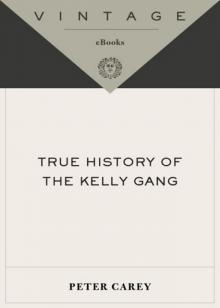 True History of the Kelly Gang
True History of the Kelly Gang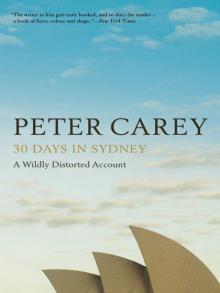 30 Days in Sydney: A Wildly Distorted Account
30 Days in Sydney: A Wildly Distorted Account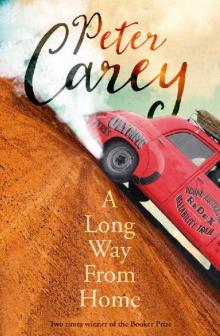 A Long Way From Home
A Long Way From Home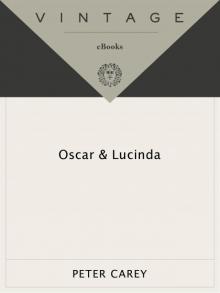 Oscar and Lucinda
Oscar and Lucinda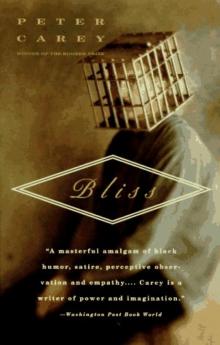 Bliss
Bliss Wrong About Japan
Wrong About Japan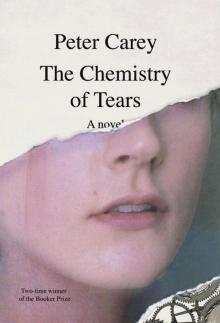 The Chemistry of Tears
The Chemistry of Tears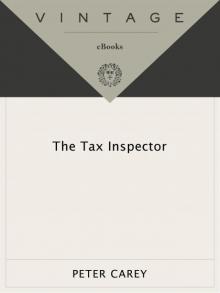 The Tax Inspector
The Tax Inspector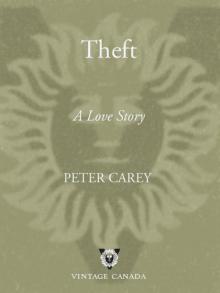 Theft: A Love Story
Theft: A Love Story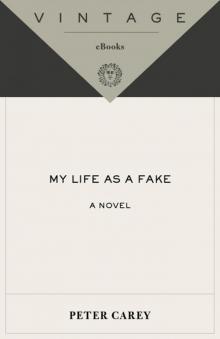 My Life as a Fake
My Life as a Fake Collected Stories
Collected Stories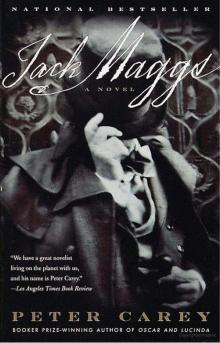 Jack Maggs
Jack Maggs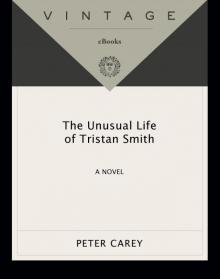 The Unusual Life of Tristan Smith
The Unusual Life of Tristan Smith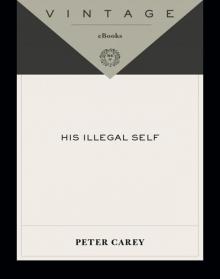 His Illegal Self His Illegal Self His Illegal Self
His Illegal Self His Illegal Self His Illegal Self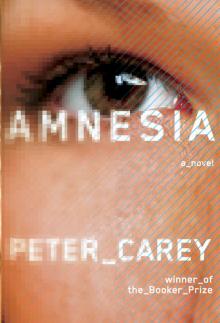 Amnesia: A Novel
Amnesia: A Novel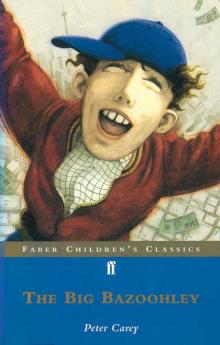 The Big Bazoohley
The Big Bazoohley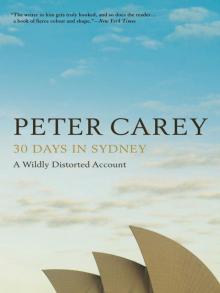 30 Days in Sydney
30 Days in Sydney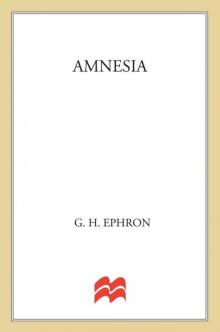 Amnesia
Amnesia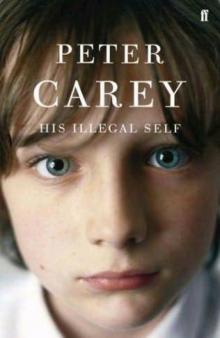 His Illegal Self
His Illegal Self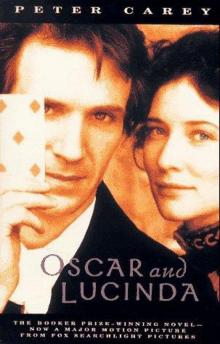 Oscar and Lucinda bw-1988
Oscar and Lucinda bw-1988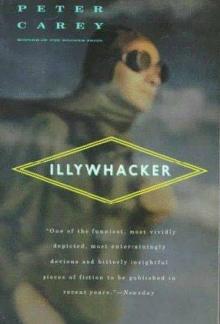 Illywhacker
Illywhacker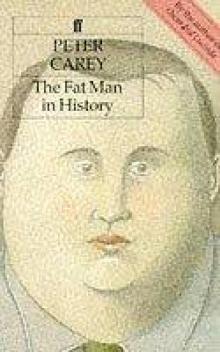 The Fat Man in History aka Exotic Pleasures
The Fat Man in History aka Exotic Pleasures